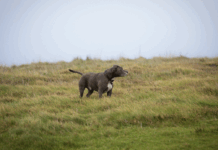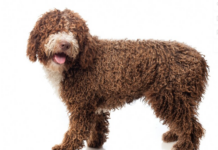Last Updated on September 18, 2024 by Dogs Vets
Boxers are more than just a powerful and athletic breed—they’re known for their loyalty, playfulness, and protective instincts, making them a popular choice among dog lovers.
In this guide, we’ll dive deep into the Boxer breed’s history, traits, and care tips to help you better understand if this energetic dog is the right fit for your home.

The Boxer’s Temperament: A Family-Friendly Dog
Boxers are known for their affectionate and protective personalities. They thrive in a family setting, offering companionship and loyalty. However, their high-energy and playful nature make them more suitable for families with older children or active adults.
Boxer Dog Characteristics
Physical Traits of the Boxer
Boxers are muscular, with short, tight-fitting coats that highlight their athletic build. Their expressive, dark eyes and wrinkled forehead give them a curious, intelligent appearance.
Social Behavior and Personality
Boxers love being around people and are often referred to as “velcro dogs” because of their desire to stay close to their owners. Early socialization with other dogs and people is key to raising a well-adjusted Boxer.
Affectionate Yet Protective Nature
Despite their sometimes intimidating size, Boxers are loving dogs that form strong bonds with their family members. They take their roles as family protectors seriously, often acting as excellent watchdogs.
Health Considerations for Boxers
Boxers are prone to several health issues that responsible owners should be aware of:
- Hip Dysplasia
- Aortic Stenosis (Heart Condition)
- Cardiomyopathy
- Degenerative Myelopathy
- Cancers (Certain Variants)
It is crucial to work with a reputable breeder who conducts regular health screenings, including hip evaluations, cardiac testing, and DNA testing for degenerative myelopathy.
Grooming and Maintenance Needs of a Boxer
Boxers are relatively low-maintenance when it comes to grooming. Their short, smooth coat only needs to be brushed once or twice a week with a rubber curry brush or hound glove. Bathing can be occasional, but regular nail trimming and teeth brushing are essential.
Exercise Requirements for Boxers: Keeping Them Fit and Happy
Boxers are energetic dogs that need ample daily exercise. Whether it’s a brisk walk, play session, or some agility training, keeping them active helps prevent behavioral problems caused by boredom. Important Note: Always keep your Boxer on a leash or in a secure area, as their hunting instincts may cause them to chase smaller animals.
Training Tips for Boxer Owners
Boxers are intelligent but can be strong-willed, so consistent, positive reinforcement methods work best. Early socialization is important, and enrolling your Boxer in puppy training classes helps manage their energy and curiosity.
Boxer’s Strengths:
- Quick learners when properly motivated
- Excel in obedience and agility training
- Natural problem solvers
Nutrition and Diet for Boxers: Keeping Your Dog Healthy
Feeding your Boxer a balanced diet is key to their long-term health. A high-quality, protein-rich dog food is recommended, and always consult your vet for advice on portion control and any dietary supplements needed.
Tips:
- Monitor calorie intake to avoid obesity
- Keep treats to a minimum during training
- Provide clean, fresh water daily
History of the Boxer Breed
The Boxer breed traces back to 19th-century Germany, where they were originally bred for hunting and working. Today, Boxers serve various roles, from family companions to police and service dogs.
Finding a Boxer Puppy: What to Look for in a Breeder
If you’re considering adding a Boxer to your family, finding a reputable breeder is crucial. Look for breeders who prioritize health testing, early socialization, and proper care for their puppies.
Conclusion: Is a Boxer the Right Dog for You?
Boxers are loyal, intelligent, and affectionate dogs, but they require an active household and plenty of attention. With proper training, socialization, and care, a Boxer can be an excellent companion for families and individuals alike.
By using this SEO-optimized content outline, you can ensure that your Boxer article ranks high on search engines while providing valuable, well-structured information to your readers.
References:























